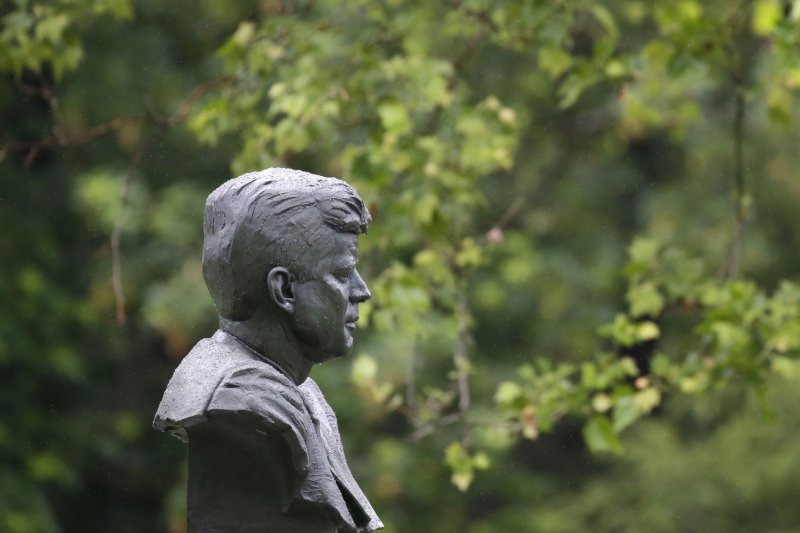1 of 5 | A memorial to John F. Kennedy stands in Prospect Park on the 100th anniversary of his birth at Grand Army Plaza park on Memorial Day in New York City on Monday. NASA observed the milestone anniversary by creating a centennial website honoring Kennedy's influence on the U.S. space program. Photo by John Angelillo/UPI |
License Photo
May 29 (UPI) -- NASA is honoring the space vision and legacy of President John F. Kennedy, who was born 100 years ago Monday.
The space agency has created a special JFK centennial website featuring images of Kennedy's biggest moments with NASA and astronauts.
"This year marks the 100th anniversary of the birth of President John F. Kennedy," NASA officials wrote on the centennial page. "Though NASA was formed by Dwight Eisenhower, President Kennedy gave the infant agency its early focus with his famous challenge to land astronauts on the moon by the end of the decade."
Before his speech, Soviet cosmonaut Yuri Gagarin became the first person to fly in space on April 12, 1961. On May 5, Alan Shepard became the first American in space.
On May 25, 1961 to a joint session of Congress, Kennedy called for increased funding for space exploration so the United States could accomplish the spaceflight goal by the end of the decade.
"First, I believe that this nation should commit itself to achieving the goal, before this decade is out, of landing a man on the moon and returning him safely to the Earth," Kennedy told Congress. "No single space project in this period will be more impressive to mankind, or more important for the long-range exploration of space; and none will be so difficult or expensive to accomplish."
On Sept. 12, Kennedy reiterated the goal before a crowd of 40,000 at Rice University in Houston.
"We choose to go to the moon," Kennedy said during the speech. "We choose to go to the moon in this decade and do the other things, not because they are easy, but because they are hard, because that goal will serve to organize and measure the best of our energies and skills, because that challenge is one that we are willing to accept, one we are unwilling to postpone, and one which we intend to win, and the others, too."
Even though the two nations were in a space race, Kennedy suggested the two sides work together on landing on the moon during a summit meeting in Vienna with Soviet Premier Nikita Khrushchev on June 3-4, 1961. Kennedy asked, "Why don't we do it together?" Khrushchev first responded positively, but the next day Khrushchev reportedly said "no," on the grounds that an agreement on disarmament must come first.
On Sept. 20, 1963, Kennedy proposed before the United Nations, "a joint expedition to the moon" and asked, "why should man's first flight to the moon be a matter of national competition?" "
Two months later, the president was assassinated in Dallas by Lee Harvey Oswald on Nov. 22.
But the moon goal was accomplished on July 20, 1969, when Apollo 11 astronauts Neil Armstrong and Buzz Aldrin landed on the moon. In all, there were six crew landings on the moon -- all by the United States. No one has walked on the moon since Eugene Cernan left the surface on Dec.14, 1972.
On the day Armstrong and Aldrin landed their Apollo 11 lander on the moon, flowers and a note were placed anonymously on Kennedy's gravesite at Arlington National Cemetery in Arlington, Va. It read: "Mr. President, the Eagle has landed."
NASA's launch site in Cape Canaveral, Fla., was named after the president: John F. Kennedy Space Center.
"What might have happened to Apollo and NASA overall, had Kennedy spent another five years in the White House, can only be a matter of speculation," space policy expert John Logsdon wrote in Ten Presidents and NASA. "We know the public's association of the space program with Kennedy was so strong that six days after Kennedy was assassinated, the new president, Lyndon Johnson, announced in a nationwide television address that the NASA center from which our moon voyagers would launch would be named in Kennedy's honor."















